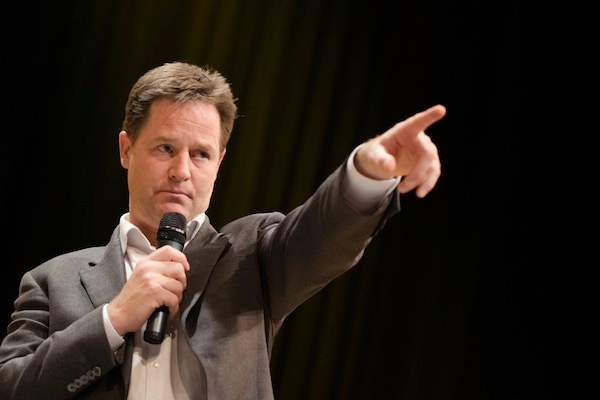The morning after the government’s defeat on the EU budget, Nick Clegg has offered his own advice on the British negotiating position. The Deputy Prime Minister gave a speech to Chatham House in which he said that pushing for a real-terms cut in the budget – which is what 307 MPs including 53 Conservative rebels voted for last night – is ‘unrealistic’. Clegg framed his attack on this negotiating position by focusing on Labour rather than Tory MPs. He said:
‘Yet it was Labour who agreed to the last long-term EU budget settlement, which saw a major jump in EU spending and lost part of the UK’s rebate in exchange for virtually no real EU spending reforms. And British taxpayers have suffered the consequences ever since, with our net contributions going from less than €3bn in 2008 to more than €7bn in 2011. Who were two of the Labour MPs to vote for it? Ed Balls and Ed Miliband. Who was the Europe Minister? Douglas Alexander.
‘Their change of heart is dishonest, it’s hypocritical. And worst of all, Labour’s plan would cost the taxpayer more, not less. Because in pushing a completely unrealistic position on the EU budget – one that is miles away from any other country’s position – Labour would have absolutely no hope of getting a budget deal agreed.’
Clegg emphasised that he and the Prime Minister are ‘united’ in holding ‘the toughest position of any European country’ in calling for a real-terms freeze, telling the audience during the ensuing question-and-answer session that there was ‘not a cigarette paper’ between himself and the PM.
But where he was keen to distance himself from the Tories was on the issue of Britain’s position in Europe, and the current debate over which European law and order measures Britain should permanently opt out of. He said:
‘The Government has said our current thinking is to opt out of them en masse, before seeking to rejoin some. But I want to be absolutely clear: a final decision has not been taken, and I will only agree to doing that if I am 100% satisfied we can opt back in to the measures needed to protect British citizens, and if I am convinced we are not creating waste and duplication, incurring unnecessary costs…
‘And to anyone who says we don’t need these EU measures to fight crime and terrorism effectively, I say prove it.Prove it to the police, the intelligence agencies, the lawyers, the victims of crime charities. Prove it to the people who deal day in day out with the worst criminals imaginable. Because my position is clear: I will not ask them to protect the British people with one hand tied behind their back.’
One of the most impassioned interventions in last night’s debate came from Clegg’s colleague Chris Huhne, who did not bother to disguise his fury with the Tory rebels. The former Energy Secretary makes very rare appearances in the Chamber these days, but last night his contribution to the debate was unmissable. He told Peter Bone that this was ‘about realism versus unreality’. He added:
‘As the honourable gentleman knows, if someone goes into a negotiation telling people exactly what they are going to do, with no room for movement whatsoever, why on earth should they bother talking to them? We heard the reality from the honourable member for Stone [Bill Cash] and that is that he, like the honourable member for Vauxhall [Kate Hoey], wants a crisis for the European Union. This has nothing whatsoever to do with these negotiations.’
David Cameron will be giving his own speech in the next few weeks on Britain and Europe. Those involved in the Corby by-election hope it will be before voters go to the polling stations on 15 November. In this he will need to address this desire in his party for what Chris Huhne called a ‘crisis for the European Union’ in order to quell the crisis of confidence that eurosceptics are experiencing in their leader’s position on Europe.







Comments